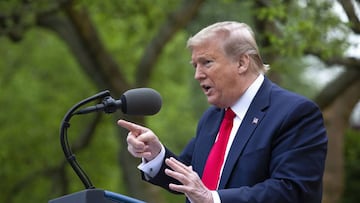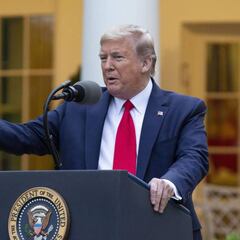What is the Tenth Amendment to the United States Constitution and why is it so important
Donald Trump claimed on Monday in his coronavirus briefing that as US president of his authority is “total”. However the Constitution, as specifically clarified by the Tenth Amendment, makes it clear he’s wrong.


With the coronavirus pandemic hitting the USA hard, with over 600,000 thousand confirmed cases, over 25,000 deaths and the economy in turmoil, Donald Trump is once again at the centre of a political storm after claiming in his Monday briefing, “When somebody’s president of the United States, the authority is total”.
His statement came in response to questions about the powers of State Governors to lift restrictions put in place to fight the spread of Covid-19. Trump’s position is that the President has the power to end stay-at-home orders put in place by the individual States.
His claim was met with an immediate reaction from across the political spectrum in the USA, on the basis that the US Constitution makes it very clear that the President has no such complete authority.
In reaction to Trump’s claim Representative Liz Cheney (R-Wyo) tweeted: “The federal government does not have absolute power”.
The federal government does not have absolute power.
— Liz Cheney (@Liz_Cheney) April 13, 2020
“The powers not delegated to the United States by the Constitution, nor prohibited by it to the States, are reserved to the States respectively, or to the people.” United States Constitution, Amendment X
New York Governor, Andrew Cuomo, also weighed in saying “We don’t have a King in this country… It's the colonies that seeded certain responsibility to a federal government. all other power remains with the states.”
US Constitution prevents "total authority"
The entire political system of the US is designed to prevent any such concentration of power in one person. This concept was reaffirmed in the Tenth Amendment to the Constitution, ratified on December 15, 1791, which sets out how federalism should work, along with the rights of the individual states.
The Tenth Amendment states: “The powers not delegated to the United States by the Constitution, nor prohibited by it to the States, are reserved to the States respectively, or to the people”.
The US Constitution was written and ratified in a period where the new country was very much focused on avoiding complete executive authority. Having just broken away from the control of a King, the framers of the constitution were absolutely focused on preventing the president having the power to become a new all powerful tyrant.
Any powers the Constitution did not specially grant to Congress or the President - such as the power to declare war or sign treaties - remained with the states.
"The President's power, if any, to issue the order must stem either from an act of Congress or from the Constitution itself," wrote Justice Hugo Black in the 1952 Supreme Court case of Youngstown Sheet & Tube Co. v. Sawyer in which the court ruled President Harry Truman had no power to take over control of the country’s steel mills despite a strike threatening production during the Korean War.
Trump’s power during the coronavirus outbreak
"It's so plain and obvious it's not even debatable," Kathleen Bergin, a law professor at Cornell University, told USA Today. "Trump has no authority to ease social distancing, or to open schools or private businesses. These are matters for states to decide under their power to promote public health and welfare, a power guaranteed by the Tenth Amendment to the Constitution."
Clearly the Federal government in the US has a major role to play in combating Covid-19, but the powers of the President are limited to what acts of Congress allow him to do and what the constitution expressly permits him to do. The President can impose or lift international travel restrictions for example, or issue directives to the military or federal agencies.
The States meanwhile exercise their own powers over quarantine and isolation, meaning it is up to State governors to issue and lift orders for people to stay at home. Indeed, President Trump has repeatedly deferred to those powers when asked about why Florida had not imposed a state-wide lockdown even after the Federal government had put out guidelines that people should stay at home to prevent the spread of coronavirus.
Tenth Amendment clarifies Federal and State powers
Of interest is that Tenth Amendment itself has been declared to be truism, a statement so obvious that is hardly worth mentioning, by the Supreme Court in a 1931 judgement, where they said it added “nothing to the [Constitution] as originally ratified.
However when it was added to the Constitution, the Tenth Amendment was felt to be important to convince states to ratify the constitution and ease the worries of those who opposed the creation of an overly powerful federal government.
Related stories
Introducing the Tenth Amendment in Congress, James Madison said that although many felt that the amendment was superfluous, many of the states were keen to include it because they were “anxious” that the powers not delegated to the constitution “should be reserved to the States”.
Trump may wish for total authority, but it's clear he does not have it.

